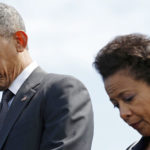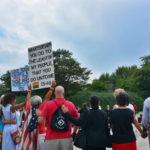WASHINGTON (RNS)—A White House advisory council March 9 submitted 164 pages of recommendations on ways the federal government can partner better with faith-based groups in tackling a host of social problems, from poverty to improving interfaith relations.
Still, some of the thorniest issues surrounding public-private partnerships—especially legal questions of discrimination in hiring—remain unsolved after White House officials decided early on they would not be included in the panel’s portfolio.
Administration officials, however, promised the 25-member panel’s suggestions will not suffer the fate of countless blue-ribbon commissions.

“It won’t just be a document on a shelf,” Health and Human Services Secretary Kathleen Sebelius said. “I promise you this document will become an active action plan in the Department of Health and Human Services.”
Sebelius, one of several officials who met with the President’s Advisory Council on Faith-based & Neighborhood Partnerships , said she hopes to work with churches and other community organizations on a range of issues, including how to continue free-lunch programs for needy students during school vacations.
The 25 members of the council, which included representatives of national faith-based and secular charities, finished their one-year term with a 164-page report that included more than 60 specific recommendations.
Melissa Rogers, chair of the council, said the diverse panelists were able to reach common ground beyond the “lowest common denominator” and will remain available as the administration considers how, or whether, to implement the recommendations.
“Whether it’s been through press statements, books or sermons, all of us have been trying to tell the government what to do for years,” she said. “But we’ve rarely received a White House invitation to make a list of recommendations.”
Sign up for our weekly edition and get all our headlines in your inbox on Thursdays
President Obama met with council-members in the White House after they concluded their final meeting. New members of the council, who also will have a one-year term, are expected to be named soon.
Environmental Protection Agency administrator Lisa Jackson told the council she is open to their recommendations to create faith-based and community-based liaisons in regional EPA offices and to sponsor a public education campaign on the environment.
“We’re taking for granted the fact that people know in this day and age how important it is,” Jackson said. “We probably need to remind them that the abundance we’re fighting to save is their heritage. It is a heritage they got from God.”
The council was formed after President Obama announced in February 2009 that he would revamp, but keep open, the former White House Office of Faith-based and Neighborhood Initiatives that he inherited from President George W. Bush.
The group's recommendations came in six different areas, including reform of the renamed White House Office of Faith-based & Neighborhood Partnerships. They suggest increased guidance so religious organizations use federal funds while respecting the separation of church and state.
In other areas, recommendations include vastly increasing the scope of interfaith service projects in cities and on college campuses; involving faith-based organizations more in addressing poverty; promoting fatherhood in the military and in prison programs; limiting the Pentagon’s role in development work; and helping nonprofit groups “green” their buildings.
Religious leaders who worked with the council describe their work as serious but said the actual implementation of the recommendations remains unclear. Joshua DuBois, the director of the office, said the administration would review the council’s recommendations and determine what could and could not be implemented.
Welton Gaddy, president of the Interfaith Alliance, said he was pleased with the “valuable process” of the task force on reforming the office but remains concerned that the hiring and discrimination questions are unresolved. Administration officials have said the White House will consult with the Justice Department on the outstanding legal questions.
Groups like the Coalition Against Religious Discrimination have criticized Obama for not fulfilling his campaign promise to prevent social service groups that receive federal money from hiring and firing employees based on their religion.
“The recommendations we’ve made could be scuttled in importance if we don’t take care of the discrimination issue,” Gaddy said. “And that’s out of the hands of the task forces and of the advisory council.”
Even so, Gaddy said, he hopes the president will act on the council’s recommendations.
“I know that there are a lot of people in this nation who want to be supportive of that office but are worried because it is still operating with the procedures put in place by former President Bush.”
Stanley Carlson-Thies, who helped Bush open the original faith-based office and was on the task force charged with reforming it, said the council’s work demonstrates that collaboration between government and religious organizations will continue, albeit in new ways.
“It is a further development down the path of a very robust engagement … that’s carefully designed not to be biased for religion and against secular but to be very inclusive of all the faith based efforts,” said Carlson-Thies, founder and president of the International Religious Freedom Alliance.














We seek to connect God’s story and God’s people around the world. To learn more about God’s story, click here.
Send comments and feedback to Eric Black, our editor. For comments to be published, please specify “letter to the editor.” Maximum length for publication is 300 words.